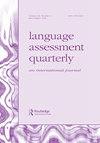An Exploration of the English Exit Examination Policy in Thai Public Universities
IF 2.8
2区 文学
0 LANGUAGE & LINGUISTICS
引用次数: 3
Abstract
ABSTRACT One of the many education reforms in Thailand is a policy aimed at improving English language proficiency among university students. One direction in this policy requires that each university administer a standardized English language test to their students before they graduate, and that the students’ scores should be aligned to the Common European Framework of Reference for Languages (CEFR) or other standards. This research study examined the English exit examination systems in Thailand by analyzing how all 81 public universities have implemented this policy. Secondary sources of data, including official documents, government statistical reports, and related research studies, were collected, and semi-structured interviews via phone were also conducted. Summative content analysis was used to analyze the data. The results showed six approaches for creation and selection of tests for policy implementation. Among these universities, different benchmarks were established. These approaches and benchmarks were developed appropriate to their management readiness and academic contexts. Also, although the policy allows for different standards to be followed, the CEFR is the only one being used. In summary, English exit examinations policy and practice might raise awareness of the importance of English and motivate students to improve their ability, but it is not likely to guarantee expected English proficiency levels.泰国公立大学英语离校考试政策探讨
泰国的众多教育改革之一是旨在提高大学生英语水平的政策。该政策的一个方向是要求每所大学在学生毕业前对他们进行标准化的英语语言测试,并且学生的分数应该与欧洲共同语言参考框架(CEFR)或其他标准保持一致。本研究通过分析泰国所有81所公立大学如何实施这一政策,考察了泰国的英语毕业考试制度。收集二手资料,包括官方文件、政府统计报告和相关研究,并通过电话进行半结构化访谈。采用总结性内容分析法对数据进行分析。结果显示了为政策执行创建和选择测试的六种方法。在这些大学中,建立了不同的基准。这些方法和基准是根据其管理准备和学术背景制定的。此外,尽管该策略允许遵循不同的标准,但CEFR是唯一使用的标准。综上所述,英语毕业考试的政策和实践可能会提高人们对英语重要性的认识,激励学生提高自己的能力,但不太可能保证预期的英语熟练程度。
本文章由计算机程序翻译,如有差异,请以英文原文为准。
求助全文
约1分钟内获得全文
求助全文

 求助内容:
求助内容: 应助结果提醒方式:
应助结果提醒方式:


